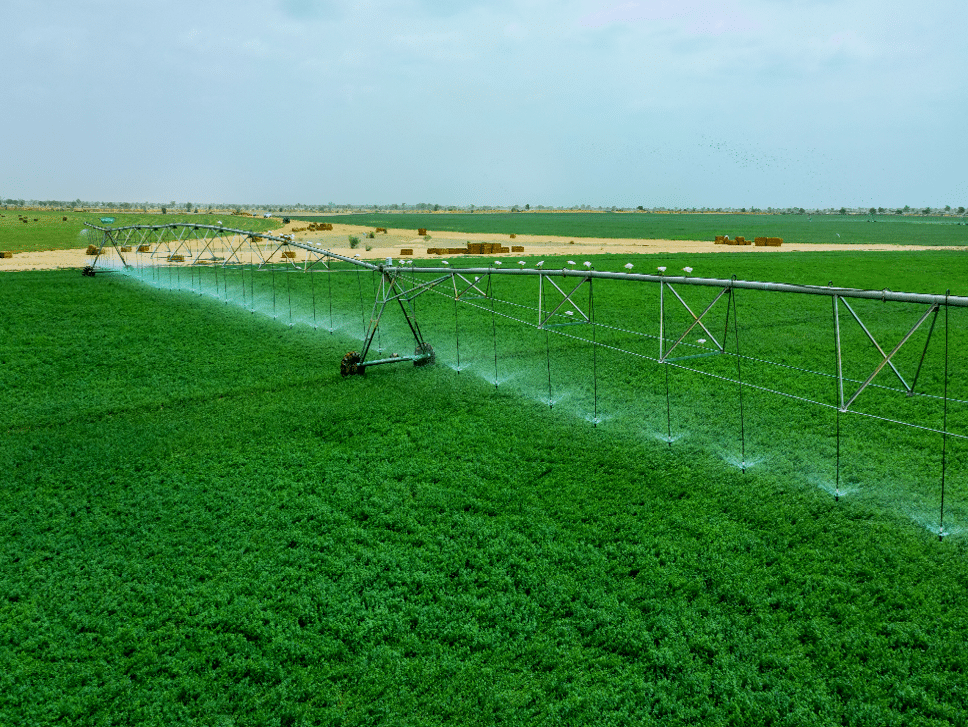
Making Hay Under The African Sun
African Agriculture, Inc. (AAGR) is a US-based for-profit entity addressing the expanding regional and global challenges of food security and the resilience of food and food supply chain systems.
AAGR is primarily a producer of necessary staples for cattle feed, primarily alfalfa, looking to expand existing production for local, regional, and export consumption from its current operations in West Africa. A critical component of livestock feed, and therefore food security, alfalfa hay currently commands record high prices.
Impacted by the Covid-19 pandemic, the Russian-Ukraine war and the severe drought since 2021 in the Western US, one of the largest alfalfa production areas in the world, the global market is poised to grow significantly. The company seeks to expand plant-based protein source production, through collaboration with local farming collectives, providing nutrition for local and regional consumption, and simultaneously driving export-based revenue and corporate profitability.
The company is confident it addresses numerous United Nations Sustainable Development Goals in its approach (albeit accidentally), as it diversifies its production offering, and exposure to climates and regions across the African continent.
“We recognized that we had a very unique geographical location to produce alfalfa,” says Chairman and CEO, Alan Kessler. “Not only is the Sahara sun a perfect operational partner–the old adage to make hay while the sun shines–but the abundance of cattle in the Sahel, quoted as over 200 million heads of cattle provides a massive market opportunity both locally and regionally for our product.”
“Local dairy and beef production is evolving as a consequence of the scaled production of our product, developing local food access, and minimizing the economic waste of imports and foreign exchange utilization. As the company looked beyond alfalfa, the key was to look for reasons for yield discrepancies in agricultural production in say, Western Europe, and that of the African continent,” he adds.
“Consistent power, farming management, machinery and capital access, logistics, agronomy, soil understanding need to be addressed. I am very proud of the experienced management team and board of directors all of whom have substantial operational experience on the African continent. We are all aligned and driven to achieve our vision.”
After considerable investment in infrastructure and feasibility studies, AAGR began its commercial alfalfa operations early in 2022 and is already seeing considerable success in transforming desert-like arid conditions to ideal growing conditions for alfalfa. AAGR is already achieving worldclass yields and quality, and is working to expand its capital base to increase its production capability.
In 2021, AAGR signed an agreement with Louisiana State University’s Agcenter to bolster education and training in Senegal. Additionally, AAGR recently signed a letter of intent with the College of Agriculture and Natural Resources at Michigan State University (MSU), to further develop the fields of soil science, agronomy, cattle nutrition, emissions, and animal genetics in Mauritania, an area of development for AAGR.
“The opportunity to work with US tertiary institutions with vast agricultural knowledge is a great pathway for skills transfer and development,” says Kessler. The company aspires to be positioned at the nexus of precision agriculture, yield optimization, and climate-smart approaches, on a continent that possesses the optimal growth conditions to address global food security challenges.
“African assets have historically been ascribed an Africa discount by global investors, given lack of liquidity in local capital markets, lack of strategic exit options, and historically challenged governance structures. Given Africa’s superior sun exposure, water purity, scalable land, extended and consistent
growing seasons that mitigate supply chain disruptions, a young and motivated local population, with a legacy in agriculture, and growing improving logistical capabilities, African agricultural opportunities should command an investment premium,” Kessler concludes.
In terms of impact, AAGR is dedicated to its local communities by partnership, creating employment and providing sustainable development. Like its icon the Baobab tree, the group believes in the ecosystem and the community which it fosters. In Senegal, this is apparent in their local land program which allocate 2000 hectares to the population of the villages of the Ndiael Reserve (Inter-Villagers Association living inside) each year. These lands are divided equally between the company’s two main local Communes of Ronkh and Ngnith. In addition, AAGR grants village organizations the distribution of alfalfa for their livestock feed. Moreover, they have implemented a maternal health program, “Shuttle for Sonograms” Before this shuttle, pregnant woman had to walk 52 kilometers on degraded roads to get Sonograms. The group now takes them in company shuttle buses to get necessary care. AAGR is currently working to repair schools, donate computers, reopen health facilities, and construct the Great Mosque of the Commune of Ngnith which covers 74 villages. They have started a dental program, working with a high school student group from the United States to boost dental awareness and provided the basics of dental health for 15,000 people. Officially they work for sports and community cohesion, via the local sports teams. AAGR defines their success in the growth of local communities. The private sector investment is anticipated to contribute to employment and economic development directly, and will include a Corporate Social Responsibility (CSR) program that will enhance the agricultural and agronomy tertiary education at ENFVA (Ecole Nationale de Formation et de Vulgarisation Agricole), an established agricultural education center in the city of Kaédi, and a women’s reinsertion program in Mauritania. www.africanagriculture.com